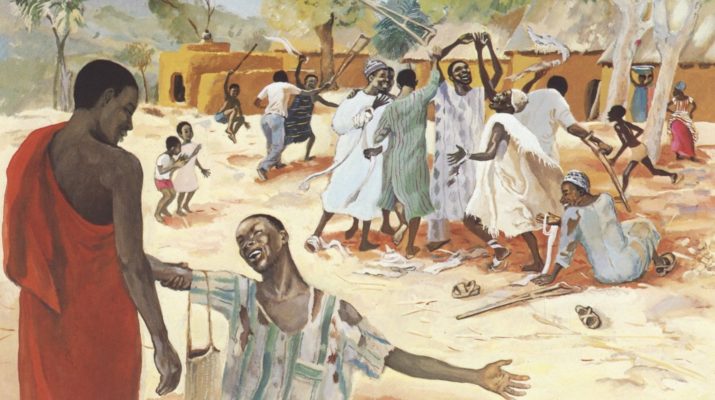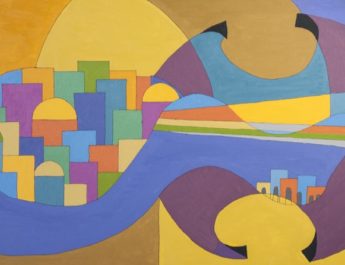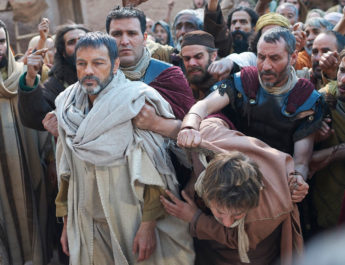Luke 17:11-19
Ordinary C46
A {untranslated} = ginomai. This is to come into being, to happen, become, be born. It can be to emerge from one state or condition to another or is coming into being with the sense of movement or growth.
B “way” = poreuomai. From poros (ford, passageway). This is to go, travel, journey, or die. It refers to transporting things from one place to another and focuses on the personal significance of the destination.
C “Jerusalem” = Ierousalem. From Hebrew Yerushalaim (probably foundation of peace); {from yarah (to throw, shoot, be stunned; to flow as water so figuratively to instruct or teach) + shalam (to make amends, to be complete or sound)}. This is Jerusalem, dwelling of peace.
Jesus was goingD through the region betweenE SamariaF and Galilee.G
D “going” = dierchomai. From dia (through, across to the other side, thoroughly) + erchomai (to come, go). This is to go through, come, depart, pierce, travel, traverse.
E “region between” = mesos. Perhaps from meta (with among, behind, beyond; implies a change following contact or action). This is middle, among, center, midst.
F “Samaria” = Samareia. 11x in NT. From Hebrew Shomron (capital of the northern kingdom of Israel); from shamar (to keep, watch, or preserve; to guard something or to protect it as a thorny hedge protects something). This is Samaria, meaning watch station.
G “Galilee” = Galilaia. From Hebrew galil (cylinder, circuit, district); from galal (to roll in a literal or figurative sense, roll away, roll down, wallow, remove, trust). This is Galilee, meaning perhaps region or cylinder.
12 As he enteredH a village,I tenJ menK with a skin diseaseL approachedM him.
H “entered” = eiserchomai. Related to “going” in v11. From eis (to, into, for, among) + erchomai (see note D above). This is to go in in a literal or figurative sense.
I “village” = kome. This is a village as contrasted with a city that has a wall.
J “ten” = deka. This is ten, a number associated with perfection (to a lesser extent than the number seven). It is where “decade” and “decathlon” come from.
K “men” = aner. This is man, male, husband, or fellow. It can also refer to an individual.
L “skin disease” = lepros. 9x in NT. From lepis (fish scale, skin flake); from lepo (to peel). This is scaly or leprous. It can also refer to a person with leprosy.
M “approached” = apantao. 2x in NT. From apo (from, away from) + antao (to meet with personally) OR from apo (from, away from) + anti (opposite, instead of, against). This is to meet or encounter.
KeepingN their distance, 13 they called out,O saying, “Jesus,P Master,Q have mercyR on us!”
N “keeping” = histemi. This is to stand, place, establish, appoint, stand ready, be steadfast.
O “called out” = airo + phone. Literally, “lifted up voice.” Airo is to lift up in a literal or figurative sense. So, it could mean to lift, carry, or raise. It could also imply lifting something in order to take it away or remove it. Figuratively, this can be used for raising the voice or level of suspense. It can mean sailing off as raising the anchor. It can also correspond to a Hebrew expression for atonement of sin (lift/remove sin). Phone is probably from phemi (to declare, say, use contrasts in speaking to shed light on one point of view); {from phao (to shine) or phaino (to bring light, cause to appear, shine, become visible or clear). This is a voice, sound, tone or noise. It can also be a language or dialect.
P “Jesus” = Iesous. From Hebrew Yehoshua (Joshua, the Lord is salvation); {from YHVH (proper name of the God of Israel; the self-existent and eternal one); {from havah (to become) or from hayah (to come to pass, become, be)} + yasha (to deliver, defend, help, preserve, rescue; properly, to be open, wide or free, which implies being safe. So, in a causative sense, this is to free someone)}. This is Jesus or Joshua in Greek – the Lord saves or the Lord is salvation.
Q “Master” = Epistates. Related to “keeping” in v12. 7x in NT– all in Luke. From epi (on, upon, what is fitting) + histemi (see note N above). This is a master, teacher, or commander. It is one who is in charge or who has authority.
R “have mercy” = eleeo. From eleos (mercy, pity, tender mercy, or compassion; generally understood in action by word or deed). This is to have pity on, show mercy to, be compassionate; often used for God’s grace. When we sing or say “kyrie eleison” (Lord, have mercy), it is from this root verb.
14 When he sawS them, he said to them, “GoT and showU yourselves to the priests.”V
S “saw” = horao. To see, perceive, attend to, look upon, experience. Properly, to stare at and so implying clear discernment. This, by extension, would indicate attending to what was seen and learned. This is to see, often with a metaphorical sense. Can include inward spiritual seeing.
T “go” = poreuomai. Same as “way” in 11. See note B above.
U “show” = epideiknumi. 7x in NT. From epi (on, upon, among, what is fitting) + deiknumi (to show, point out, exhibit; figurative for teach, demonstrate, make known). This is to show, demonstrate, prove, or display.
V “priests” = hiereus. From hieros (sacred, something sacred, temple, holy, set apart; something consecrated to God or a god). This is a priest, used for Jewish and Gentile priests.
AndW as they went,X they were made clean.Y
W {untranslated} = ginomai. Same as {untranslated} in v11. See note A above.
X “went” = hupago. From hupo (by, under, under the authority of) + ago (lead, bring, guide, spend, drive, carry). This is to lead under so to depart, go away, or die. It is to lead away under the command of someone else, being given a mission or objective to carry out.
Y “made clean” = katharizo. From katharos (clean, clear, pure, unstained; clean in a literal, ritual, or spiritual sense; so, also guiltless, innocent or upright; something that is pure because it has been separated from the negative substance or aspect; spiritually clean because of God’s act of purifying). This is to cleanse, make clean, purify, purge, or declare to be clean. Like its roots, it includes cleansing in a literal, ritual, or spiritual sense. Being pure or purified is not something that is only available to the rare few or the innocent. Anyone can be purified.
15 Then oneZ of them, when he saw that he was healed,AA turned back,BB
Z “one” = heis. This is one, a person, only, some.
AA “healed” = iaomai. This is to heal, particularly from a physical illness, but it could also be a spiritual difficulty. This is to cure or make whole in a literal or figurative sense.
BB “turned back” = hupostrepho. From hupo (by, under, about) + strepho (to turn, change, turn back, be converted; to turn around completely to take the opposite path or a completely different one); {from trope (turning, shifting, a revolution; figuratively, a variation); from trepo (to turn)}. This is to turn back or behind in a literal or figurative sense.
praisingCC GodDD with a loudEE voice.FF
CC “praising” = doxazo. From doxa (glory, opinion, praise, honor, renown; particularly used as a quality of God or manifestation of God – splendor); from dokeo (to have an opinion, seem, appear, suppose; a personal judgment; to think); from dokos (opinion). This is to render or hold something as glorious, to glorify, honor, magnify, or celebrate. This is ascribing weight to something by recognizing its true value or essence.
DD “God” = Theos. From Proto-Indo-European origins, meaning do, put, place. This is God or a god in general.
EE “loud” = megas. This is big in a literal or figurative sense – great, large, exceeding, abundant, high, mighty, perfect, strong, etc.
FF “voice” = phone. Same as “called out” in v13. See note O above.
16 He prostratedGG himselfHH at Jesus’s feetII and thankedJJ him. And he was a Samaritan.KK
GG “prostrated” = pipto. This is to fall literally or figuratively.
HH “himself” = epi + prosopon. Literally, “on face.” Prosopon is related to “saw” in v14. from pros (at, towards, with) + ops (eye, face); {from optanomai (to appear, be seen); perhaps from horao (see note S above)}. This is the face, surface, or front. It can imply presence more generally.
II “feet” = pous. This is foot in a literal or figurative sense.
JJ “thanked” = eucharisteo. From eu (good, well, well done, rightly) + charis (grace, kindness, favor, gratitude, thanks; being inclined to or favorable towards – leaning towards someone to share some good or benefit; literal, figurative, or spiritual; grace as abstract concept, manner, or action); {from chairo (to rejoice, be glad; used to say hello; properly, delighting in the grace of God or experiencing God’s favor); from char– (to extend favor, lean towards, be inclined to be favorable towards)}. This is giving thanks, being thankful. It is a recognition that God’s grace is good and actively showing gratitude. It can also be used for saying grace before eating. This is where “eucharist” comes from.
KK “Samaritan” = Samarites. Related to “Samaria” in v11. 9x in NT. From samareia (see note F above). This is Samaritan.
17 Then Jesus asked, “Were not ten made clean? So where are the other nine?LL 18 Did none of themMM returnNN to giveOO gloryPP to God except this foreigner?”QQ
LL “nine” = ennea. 5x in NT. This is nine. It is part of the root of the word “enneagram.”
MM {untranslated} = heurisko. This is to find, learn, or obtain. It is to discover something, which generally implies a period of searching for it. This is to find in a literal or figurative sense. This is where the word “heuristic” comes from.
NN “return” = hupostrepho. Same as “turned back” in v15. See note BB above.
OO “give” = didomi. To give, offer, place, bestow, deliver. This is give in a literal or figurative sense.
PP “glory” = doxa. Related to “praising” in v15. See note CC above.
QQ “foreigner” = allogenes. Related to {untranslated} in v11. 1x in NT. From allos (other, another; another of a similar kind or type) + genos (family, offspring, kin – in a literal or figurative sense); {from ginomai (see note A above)}. This is a foreigner or stranger, i.e. someone from a different nation.
19 Then he said to him, “Get upRR and go on your way; your faithSS has made you well.”TT
RR “get up” = anistemi. Related to “keeping” in v12 & “Master” In v13. From ana (upwards, up, again, back, anew) + histemi (see note N above). This is to raise up, rise, appear. It is to stand up literally or figuratively. Can also mean to resurrect.
SS “faith” = pistis. From peitho (to have confidence, urge, be persuaded, agree, assure, believe, have confidence, trust). This is less about knowing, believing, and repeating a list of doctrines then it is about trusting God. Faith means listening to God and seeking to live a holy life even (and especially) when we don’t understand how everything works or fits together. Faith is about being faithful (trusting and doing) rather than being all knowing.
TT “made…well” = sozo. From sos (safe, rescued, well). This is to save, heal, preserve, or rescue. Properly, this is taking someone from danger to safety. It can be delivering or protecting literally or figuratively. This is the root that “savior” and “salvation” come from in Greek.
Image credit: “Healing of the Ten Lepers” by Jesus MAFA from Cameroon, 1973.




